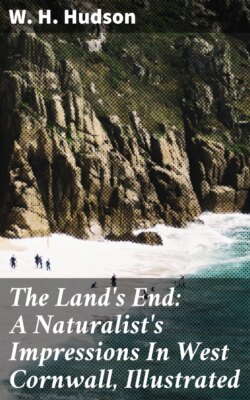Читать книгу The Land's End: A Naturalist's Impressions In West Cornwall, Illustrated - W. H. Hudson - Страница 7
На сайте Литреса книга снята с продажи.
Original
ОглавлениеDoubtless he is to be seen there all the year round as he is so common a town bird all over the country, but at St. Ives many of the cliffbreeding daws settle down regularly for the winter and exist very comfortably on the fish and other refuse thrown into the streets. Very soon I established a sort of friendship with a few of these birds; for birds I must have, in town or country-free birds I mean, as the captive bird only makes me melancholy—and in winter I feed them whether they are in want or not. It is an old habit of mine, first practised in early life in June and July, the cold winter months in the southern hemisphere, in a land where the English sparrow was not. Now, unhappily, he is there and a great deal too abundant. I fed a better sparrow in those vanished days, smaller and more prettily shaped than our bird, with a small crest on his head and a sweet delicate little song. But in England one really gets far more pleasure from feeding the birds on account of the number of different species which are willing to be our pensioners. At St. Ives I first stayed at a house in The Terrace facing the sea-front, and there were no gardens there, so that I had to feed them out in the road. First there were only sparrows, then a pair of jackdaws turned up, and soon others joined them until I had about a score of them. By and by a very big shaggy sheep-dog, belonging to a carter, discovered that there was food to be got at eight o'clock at that spot in the road, and he too came very punctually every day and thoughtlessly gobbled it all up himself. After two or three days of this sort of thing, I felt that it ought not to be allowed to continue, and as the daws were of the same mind and loyally seconded my efforts to stop it we were soon successful. My plan was to go out and scatter the scraps and crusts far and wide over the road, and while the greedy dog galloped about from crust to crust the daws, hovering overhead, dropped down and snatched them one by one away before he could reach them.
Later, when leaving St. Ives, I asked the landlady to explain to the birds on the following morning the reason of there being nothing for them, and to request them to go quietly away. They were very intelligent, I said, and would understand; but on my return, a month later, she said they had not understood the message, or had not believed her, as they had continued to come for several mornings, and had seemed very much put out. It was plain they had kept an eye on that house during my absence, for on going out with scraps on the morning after my return they promptly reappeared in full force on the scene.
There are few persons to feed the birds in those parts, and those few, I fancy, are mostly visitors from other counties. It amused me to see how the natives regarded my action; the passer-by would stop and examine the scraps or crusts, then stare at me, and finally depart with a puzzled expression on his countenance, or perhaps smiling at the ridiculous thing he had witnessed.
The following winter (1906-7) I found a lodging in another part of the town, in a terrace rather high up, where I could look from my window at the Bay over the tiled roofs of the old town. Here I had a front garden to feed the birds in, and, better still, the entire jackdaw population of St. Ives, living on the roofs as is their custom, were under my eyes and could be observed very comfortably. I discovered that they filled up a good deal of their vacant time each morning in visiting the chimneys from which smoke issued, just to inform themselves, as it seemed, what was being cooked for breakfast. This was their pastime and watching them was mine. Numbers of daws would be seen, singly, in pairs, and in groups of three or four to half a dozen, sitting on the roofs all over the place. As the morning progressed and more and more chimneys sent out smoke, they would become active visiting the chimneys, where, perching on the rims, they would put their heads down to get the smell rising from the pot or frying-pan on the fire below. If a bird remained long perched on a chimney-pot, his neighbours would quickly conclude that he had come upon a particularly interesting smell and rush off to share it with him. When the birds were too many there would be a struggle for places, and occasionally it happened that a puff of dense black smoke would drive them all off together.
A dozen incidents of this kind could be witnessed any morning, and I was as much entertained as if I had been observing not birds but a lot of lively, tricky little black men with grey pates inhabiting the roofs. One morning when watching a pair perched facing each other on a chimney-top their movements and gestures made me imagine that I knew just what they were saying.
